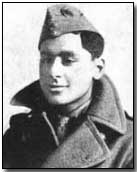Indra Lal Roy
| Indra Lal Roy | |
|---|---|

Indra Lal Roy in his Royal Flying Corps uniform.
|
|
| Native name | ইন্দ্রলাল রায় |
| Nickname(s) | "Laddie" |
| Born |
2 December 1898 Calcutta, British India |
| Died | 22 July 1918 (aged 19) Carvin, France |
| Buried at | Estevelles Communal Cemetery, Pas-de-Calais, France (50°28′32″N 2°54′02″E / 50.47556°N 2.90056°ECoordinates: 50°28′32″N 2°54′02″E / 50.47556°N 2.90056°E) |
| Allegiance | United Kingdom |
| Service/branch | British Army Royal Air Force |
| Years of service | 1917–1918 |
| Rank | Lieutenant |
| Unit |
No. 56 Squadron RFC No. 40 Squadron RAF |
| Battles/wars | World War I • Western Front |
| Awards | Distinguished Flying Cross |
| Relations | Paresh Lal Roy (brother) |
Indra Lal Roy (Bengali: ইন্দ্রলাল রায়), DFC (2 December 1898 – 22 July 1918) is the sole Indian World War I flying ace. While serving in the Royal Flying Corps and its successor, the Royal Air Force, he claimed ten aerial victories; five aircraft destroyed (one shared), and five 'down out of control' (one shared) in just over 170 hours flying time.
The second son of Piera Lal Roy and Lolita Roy, he was born in Calcutta, where his father was a barrister and Director of Public Prosecutions. He was nicknamed "Laddie". Roy came from a highly qualified and distinguished family. His older brother, Paresh Lal Roy (1893–1979), served in the 1st Battalion, Honourable Artillery Company, and later became known as the "father of Indian boxing." His maternal grandfather, Dr. Surya Kumar Goodeve Chakraborty, was one of the first Indian doctors to be trained in Western medicine. His nephew, Subroto Mukerjee (1911–1960), served as a fighter pilot in World War II, and later became the first Indian Chief of Air Staff of the Indian Air Force.
When the First World War broke out, Roy was attending St Paul's School, Hammersmith in London, England. Initially rejected by the Royal Flying Corps on the grounds of defective eyesight, Roy paid for a second opinion from a leading eye specialist, and the decision was overturned. Five months after turning 18, on 4 April 1917 he joined the RFC, and was commissioned as a second lieutenant on 5 July. After training and gunnery practice at Vendôme and Turnberry, he joined No. 56 Squadron on 30 October. Roy was part of "A" Flight, commanded by Captain Richard Maybery.
...
Wikipedia
